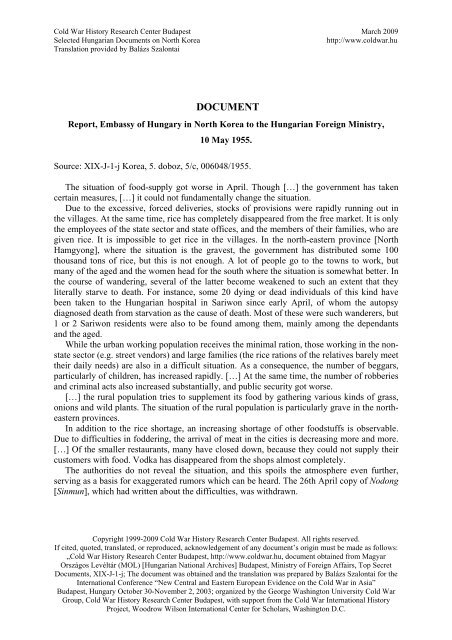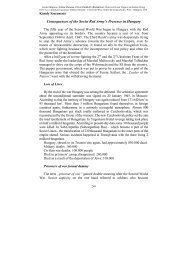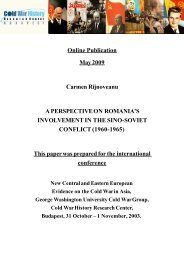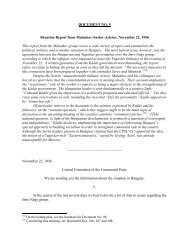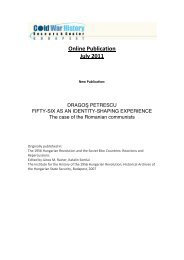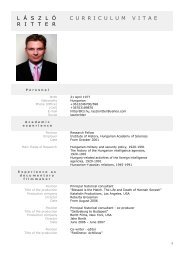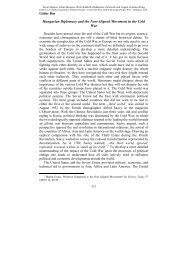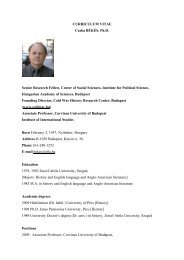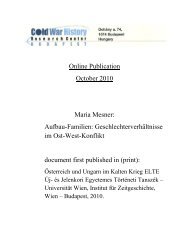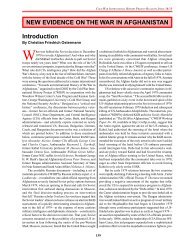Download pdf - Cold War History Research Center
Download pdf - Cold War History Research Center
Download pdf - Cold War History Research Center
You also want an ePaper? Increase the reach of your titles
YUMPU automatically turns print PDFs into web optimized ePapers that Google loves.
<strong>Cold</strong> <strong>War</strong> <strong>History</strong> <strong>Research</strong> <strong>Center</strong> Budapest March 2009<br />
Selected Hungarian Documents on North Korea<br />
http://www.coldwar.hu<br />
Translation provided by Balázs Szalontai<br />
DOCUMENT<br />
Report, Embassy of Hungary in North Korea to the Hungarian Foreign Ministry,<br />
10 May 1955.<br />
Source: XIX-J-1-j Korea, 5. doboz, 5/c, 006048/1955.<br />
The situation of food-supply got worse in April. Though […] the government has taken<br />
certain measures, […] it could not fundamentally change the situation.<br />
Due to the excessive, forced deliveries, stocks of provisions were rapidly running out in<br />
the villages. At the same time, rice has completely disappeared from the free market. It is only<br />
the employees of the state sector and state offices, and the members of their families, who are<br />
given rice. It is impossible to get rice in the villages. In the north-eastern province [North<br />
Hamgyong], where the situation is the gravest, the government has distributed some 100<br />
thousand tons of rice, but this is not enough. A lot of people go to the towns to work, but<br />
many of the aged and the women head for the south where the situation is somewhat better. In<br />
the course of wandering, several of the latter become weakened to such an extent that they<br />
literally starve to death. For instance, some 20 dying or dead individuals of this kind have<br />
been taken to the Hungarian hospital in Sariwon since early April, of whom the autopsy<br />
diagnosed death from starvation as the cause of death. Most of these were such wanderers, but<br />
1 or 2 Sariwon residents were also to be found among them, mainly among the dependants<br />
and the aged.<br />
While the urban working population receives the minimal ration, those working in the nonstate<br />
sector (e.g. street vendors) and large families (the rice rations of the relatives barely meet<br />
their daily needs) are also in a difficult situation. As a consequence, the number of beggars,<br />
particularly of children, has increased rapidly. […] At the same time, the number of robberies<br />
and criminal acts also increased substantially, and public security got worse.<br />
[…] the rural population tries to supplement its food by gathering various kinds of grass,<br />
onions and wild plants. The situation of the rural population is particularly grave in the northeastern<br />
provinces.<br />
In addition to the rice shortage, an increasing shortage of other foodstuffs is observable.<br />
Due to difficulties in foddering, the arrival of meat in the cities is decreasing more and more.<br />
[…] Of the smaller restaurants, many have closed down, because they could not supply their<br />
customers with food. Vodka has disappeared from the shops almost completely.<br />
The authorities do not reveal the situation, and this spoils the atmosphere even further,<br />
serving as a basis for exaggerated rumors which can be heard. The 26th April copy of Nodong<br />
[Sinmun], which had written about the difficulties, was withdrawn.<br />
Copyright 1999-2009 <strong>Cold</strong> <strong>War</strong> <strong>History</strong> <strong>Research</strong> <strong>Center</strong> Budapest. All rights reserved.<br />
If cited, quoted, translated, or reproduced, acknowledgement of any document’s origin must be made as follows:<br />
„<strong>Cold</strong> <strong>War</strong> <strong>History</strong> <strong>Research</strong> <strong>Center</strong> Budapest, http://www.coldwar.hu, document obtained from Magyar<br />
Országos Levéltár (MOL) [Hungarian National Archives] Budapest, Ministry of Foreign Affairs, Top Secret<br />
Documents, XIX-J-1-j; The document was obtained and the translation was prepared by Balázs Szalontai for the<br />
International Conference “New Central and Eastern European Evidence on the <strong>Cold</strong> <strong>War</strong> in Asia”<br />
Budapest, Hungary October 30-November 2, 2003; organized by the George Washington University <strong>Cold</strong> <strong>War</strong><br />
Group, <strong>Cold</strong> <strong>War</strong> <strong>History</strong> <strong>Research</strong> <strong>Center</strong> Budapest, with support from the <strong>Cold</strong> <strong>War</strong> International <strong>History</strong><br />
Project, Woodrow Wilson International <strong>Center</strong> for Scholars, Washington D.C.
<strong>Cold</strong> <strong>War</strong> <strong>History</strong> <strong>Research</strong> <strong>Center</strong> Budapest March 2009<br />
Selected Hungarian Documents on North Korea<br />
http://www.coldwar.hu<br />
Translation provided by Balázs Szalontai<br />
At present, in early May, a certain improvement is to be expected. The Soviet Union and<br />
China are increasing their grain shipments, and by the middle of May, they have transported<br />
some 60 000 tons of grain. This enables the government to ensure that the urban population<br />
gets the basic food-supply. At the same time, the ripening of various vegetables and onions<br />
alleviates the situation in the villages. In the middle of June, barley and certain cereal crops<br />
are harvested here too, which will also alleviate the situation. However, a fundamental change<br />
in the situation can be made only after the October rice harvest.<br />
[…]<br />
Dr László Keresztes<br />
Chargé d’Affaires ad interim<br />
Copyright 1999-2009 <strong>Cold</strong> <strong>War</strong> <strong>History</strong> <strong>Research</strong> <strong>Center</strong> Budapest. All rights reserved.<br />
If cited, quoted, translated, or reproduced, acknowledgement of any document’s origin must be made as follows:<br />
„<strong>Cold</strong> <strong>War</strong> <strong>History</strong> <strong>Research</strong> <strong>Center</strong> Budapest, http://www.coldwar.hu, document obtained from Magyar<br />
Országos Levéltár (MOL) [Hungarian National Archives] Budapest, Ministry of Foreign Affairs, Top Secret<br />
Documents, XIX-J-1-j; The document was obtained and the translation was prepared by Balázs Szalontai for the<br />
International Conference “New Central and Eastern European Evidence on the <strong>Cold</strong> <strong>War</strong> in Asia”<br />
Budapest, Hungary October 30-November 2, 2003; organized by the George Washington University <strong>Cold</strong> <strong>War</strong><br />
Group, <strong>Cold</strong> <strong>War</strong> <strong>History</strong> <strong>Research</strong> <strong>Center</strong> Budapest, with support from the <strong>Cold</strong> <strong>War</strong> International <strong>History</strong><br />
Project, Woodrow Wilson International <strong>Center</strong> for Scholars, Washington D.C.


